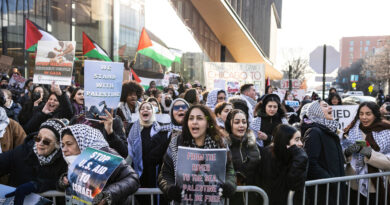To Bolster Russia’s Army, Putin Eases Citizenship Path for Foreign Fighters
[ad_1]
President Vladimir V. Putin of Russia has approved a measure that makes it easier for foreigners to acquire Russian citizenship if they enlist in the army amid the war in Ukraine, part of an effort to increase the military’s ranks while also sparing Russians from being deployed to the battlefield.
Under the decree, which the Kremlin published on Thursday, foreigners who sign a one-year contract with the Russian Army or volunteer for “army formations” during what Moscow calls its “special military operation” in Ukraine can apply for Russian citizenship under a fast-track procedure. The benefits also extend to the recruits’ spouses, children and parents.
Unlike those who go through Russia’s regular citizenship process, such foreigners would not need to live in the country for five consecutive years under a residence permit before applying. They would also be spared requirements to speak Russian and be familiar with the country’s history and basic laws.
A decision on such applications will take only one month instead of the usual three, according to the decree.
The Kremlin has already used similar enticements twice during the war in Ukraine. Mr. Putin first accelerated the citizenship process for foreigners who joined the fighting in September 2022, a time when Russian forces were suffering painful defeats in the Kharkiv region. The Kremlin then further streamlined the process in May last year, removing a requirement that foreigners take part in armed combat for at least six months before seeking citizenship.
Since Mr. Putin ordered a draft of as many as 300,000 reservists in September 2022 — a sharply unpopular move that was the country’s first general mobilization since World War II — speculation has persisted that the army would require another wave to replenish its ranks. But the Kremlin has insisted that volunteers are plentiful and that no general draft is necessary.
Last month, Mr. Putin said that 486,000 new recruits had joined the army in 2023 and that 1,500 a day were signing contracts. He also ordered an expansion of the army’s ranks by 170,000, to 1.32 million — the second such increase since the February 2022 invasion of Ukraine.
A new round of mobilization would be highly unpopular among the Russian public, polls have suggested, so the Kremlin has been going to great lengths to avoid one. Russian cities have been plastered with posters that promise high payments and elevated status to recruits. And in the country’s prisons, inmates — including those convicted of murder — have been offered pardons in exchange for fighting in Ukraine.
Last year, more than three million migrant workers came to Russia from the poorer Central Asian nations of Kyrgyzstan, Tajikistan and Uzbekistan. They typically work in basic service and construction jobs, and many seek Russian citizenship.
In recent months, law enforcement officers have been pursuing foreigners who hold Russian passports in the country, tracking them down in mosques and in warehouses where many of them work. More than 3,000 migrants were detained in St. Petersburg on New Year’s Eve, according to Novaya Gazeta, a Russian newspaper. And some migrants have reported being forced to sign contracts with the army, according to Astra, a Russian news outlet.
Apart from considering migrants potential recruits for the war, Russia is also relying on them as its economy experiences an acute labor shortage, with its general population aging and many factories aiming to speed up the production of weapons.
On Thursday, in addition to signing the decree targeting army recruits, Mr. Putin approved a fast-track Russian citizenship process for citizens of Ukraine who lived in Crimea before Russia’s 2014 illegal annexation of the peninsula. That decree also covers citizens of Afghanistan, Iraq, Syria and Yemen who were born in Soviet territory and held Soviet citizenship.
[ad_2]
Source link



